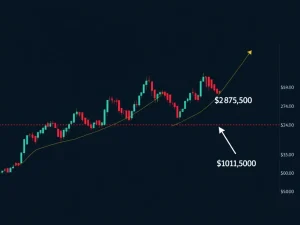Cardano Governance Unleashed: ADA Whale Revolt Triggers Legal Battle with Charles Hoskinson

The world of decentralized finance thrives on community participation, but what happens when that participation turns into a full-blown revolt? The Cardano ecosystem is currently grappling with a high-stakes Cardano governance crisis, a situation that pits a significant stakeholder against the very development firm that built the blockchain. This unfolding drama not only highlights the complexities of decentralized decision-making but also sets a precedent for how major crypto projects navigate internal disagreements.
The ADA Whale’s Seismic Challenge: What Triggered the Uproar?
A prominent Cardano holder, known only as ‘Whale,’ has ignited a significant controversy within the community. This isn’t just any ordinary user; ‘Whale’ reportedly commands an impressive 6 million ADA in delegated voting power, making their voice a formidable force in the network’s governance. The core of their grievance is a stark accusation against Input Output Global (IOG), the development firm led by Cardano founder Charles Hoskinson.
- Allegations of Misuse: ‘Whale’ claims IOG has misused millions in ADA funds, failing to deliver on promised developments, particularly concerning scaling solutions.
- Rejection of IOG Proposals: In a bold move, ‘Whale’ has declared a rejection of all future proposals from IOG.
- Call for Delegation: This rejection triggered an immediate governance revolt. As a crucial vote on the 2025 Cardano Summit proposal commenced, ‘Whale’ urged other stakeholders to delegate their ADA to representatives who actively oppose IOG’s initiatives, effectively mobilizing a segment of the community against the firm.
This challenge represents a rare but significant test of IOG’s authority and influence within the decentralized Cardano framework, pushing the boundaries of community oversight and accountability.
Charles Hoskinson’s Swift Response: Defamation or Defense?
The accusations did not go unanswered. Charles Hoskinson, the charismatic founder of Cardano and leader of IOG, responded swiftly and assertively to ‘Whale’s’ claims. His reaction underscores the intense pressure and scrutiny that come with leading a major blockchain project.
- Denial of Neglect: Hoskinson vehemently denied any neglect in scaling development, clarifying that such work is actively ‘underway.’ He dismissed the criticism as ‘pettiness on-chain,’ suggesting it was an unwarranted attack rather than constructive feedback.
- Questioning Representation: He also emphasized that ‘Whale’ does not represent the broader Cardano community, implying that one large holder’s opinion does not necessarily reflect the collective sentiment.
- Legal Consultations: Perhaps the most dramatic turn in this unfolding crypto dispute was Hoskinson’s revelation of having consulted legal counsel. He hinted at potential defamation action against ‘Whale’ following the serious accusations of financial mismanagement.
This legal stance has drawn immediate comparisons within the crypto space to Craig Wright’s controversial strategies in the Bitcoin SV (BSV) ecosystem. Wright’s aggressive litigation tactics, often targeting critics and developers, have allegedly harmed BSV’s reputation and stifled open discourse. Some Cardano users now fear a similar outcome if this dispute escalates into protracted legal battles, potentially alienating parts of the community and damaging Cardano’s image as an open, decentralized platform.
Unpacking the IOG Proposals: A Battle Over Funds and Promises
At the heart of this conflict lies the community’s trust in IOG’s management of funds and its strategic direction. The rejection of IOG proposals by a significant voter like ‘Whale’ is a direct challenge to the firm’s operational autonomy and its perceived commitment to core development.
The debate highlights a fundamental tension: how should a decentralized project balance the need for efficient development by a core team with the community’s demand for transparency and accountability, especially regarding substantial financial resources?
Community members have taken varied stances:
- Cardano Rep’s Nuance: Prominent user ‘Cardano Rep’ shifted their delegation amidst the debate, advocating for a balanced approach. While acknowledging that IOG has room for improvement, they argued against entirely abandoning the development firm, recognizing its foundational role in the ecosystem.
- Toshi’s Alignment with ‘Whale’: Other users, including ‘Toshi,’ have sided with ‘Whale,’ echoing criticisms that IOG has focused excessively on governance upgrades while neglecting core scaling solutions that are crucial for Cardano’s long-term adoption and performance.
This division underscores the complexities of decentralized governance, where different factions hold strong beliefs about the project’s priorities and the allocation of resources. The outcome of the 2025 summit vote, currently underway, will be a critical indicator of where the community’s collective sentiment truly lies.
Transparency Efforts Amidst the Storm: The $500 Million Audit
In a significant move to address the allegations of financial discrepancies, Charles Hoskinson announced the completion of a draft audit. This audit specifically targets claims of a staggering $500 million ADA discrepancy, a figure that, if true, would represent a massive misuse of funds.
Hoskinson has pledged to livestream the report’s release, signaling a commitment to transparency. This public unveiling is intended to directly counter the accusations and provide clarity on IOG’s financial dealings. The findings of this audit could be a pivotal moment, potentially either vindicating IOG and quelling the revolt or validating ‘Whale’s’ concerns and intensifying the governance crisis.
The community will be watching closely, as the audit’s findings will undoubtedly influence future delegation decisions and the overall trust in IOG’s stewardship of the Cardano ecosystem.
The Broader Crypto Dispute: What Does This Mean for Decentralization?
This specific conflict within Cardano is more than just an internal squabble; it’s a microcosm of the challenges inherent in decentralized governance across the entire crypto landscape. The clash between the ADA whale and IOG highlights fundamental questions about power dynamics, accountability, and the very spirit of decentralization.
- Balancing Power: How much influence should large token holders have, and how can their power be checked to prevent potential tyranny of the minority or majority?
- Developer Accountability: How can communities hold core development teams accountable for their promises and financial management in a system designed to be trustless?
- Preventing Centralization: While decentralization aims to distribute power, the presence of influential figures and core development firms can inadvertently create points of centralization. This dispute tests how resilient Cardano’s governance truly is against such pressures.
The outcome of this dispute will undoubtedly serve as a case study for other blockchain projects striving for true decentralized governance. It underscores that even with robust on-chain mechanisms, human elements—trust, accusations, and legal threats—play a significant role in shaping a project’s future.
Navigating the Storm: Cardano’s Path Forward
The coming weeks and months will be critical for Cardano. The resolution, or escalation, of this dispute will significantly impact the project’s trajectory and its reputation within the broader crypto market.
Key factors to watch include:
- The 2025 Summit Vote: The results of this vote will clearly indicate the community’s current alignment regarding IOG’s proposals and overall direction.
- The Audit Findings: The transparency and conclusions of the $500 million ADA discrepancy audit will be crucial in restoring or eroding trust.
- Legal Developments: Any actual legal action taken by Hoskinson could have far-reaching consequences, potentially alienating users who view the governance revolt as a legitimate push for fiscal responsibility, even as it aims to protect the project’s integrity.
This pivotal moment will determine whether Cardano can effectively balance innovation with accountability, setting a precedent for its decentralized governance model for years to come.
The Cardano governance revolt, triggered by the accusations of a powerful ADA whale and met with legal threats from founder Charles Hoskinson, marks a defining period for the project. This high-stakes crypto dispute not only challenges IOG’s authority but also profoundly tests the resilience and true decentralization of the Cardano ecosystem. As the community awaits the outcomes of critical votes and a significant financial audit, the world watches to see if Cardano can navigate this internal storm and emerge stronger, proving the viability of its decentralized ideals amidst intense scrutiny and conflict.
Frequently Asked Questions (FAQs)
1. Who is the ‘ADA Whale’ and what is their significance?
The ‘ADA Whale’ refers to a major Cardano holder who reportedly controls approximately 6 million ADA in delegated voting power. Their significance lies in their substantial influence over Cardano’s decentralized governance decisions, as demonstrated by their ability to reject proposals and rally community support against IOG.
2. What are the main accusations leveled against Input Output Global (IOG)?
The primary accusation against IOG, led by Charles Hoskinson, is the alleged misuse of millions in ADA funds without delivering on promises, particularly concerning core scaling solutions for the Cardano network. The ‘Whale’ claims a lack of progress despite significant expenditure.
3. How has Charles Hoskinson responded to these allegations?
Charles Hoskinson has strongly denied the allegations, dismissing them as ‘pettiness on-chain.’ He stated that scaling work is ‘underway’ and that the ‘Whale’ does not represent the broader community. Furthermore, he has revealed legal consultations, hinting at potential defamation action against the accuser.
4. Why are Hoskinson’s legal threats being compared to Craig Wright?
Hoskinson’s legal threats are compared to Craig Wright’s controversial strategies in the Bitcoin SV (BSV) ecosystem because Wright has a history of aggressive litigation against critics and developers. Some Cardano users fear that similar tactics could harm Cardano’s reputation, stifle open discussion, and alienate community members, regardless of the validity of the claims.
5. What is the significance of the 2025 Cardano Summit proposal vote?
The vote on the 2025 Cardano Summit proposal is significant because it is a direct test of the community’s current sentiment regarding IOG’s direction and the ‘Whale’s’ call for opposition. Its outcome will indicate the level of support or dissent within the decentralized governance model.
6. What is the purpose of the $500 million ADA discrepancy audit?
The audit, announced by Charles Hoskinson, aims to address and clarify claims of a $500 million ADA discrepancy. Its purpose is to provide transparency regarding IOG’s financial management and potentially counter the accusations of fund misuse, thereby influencing community trust and the ongoing dispute.






